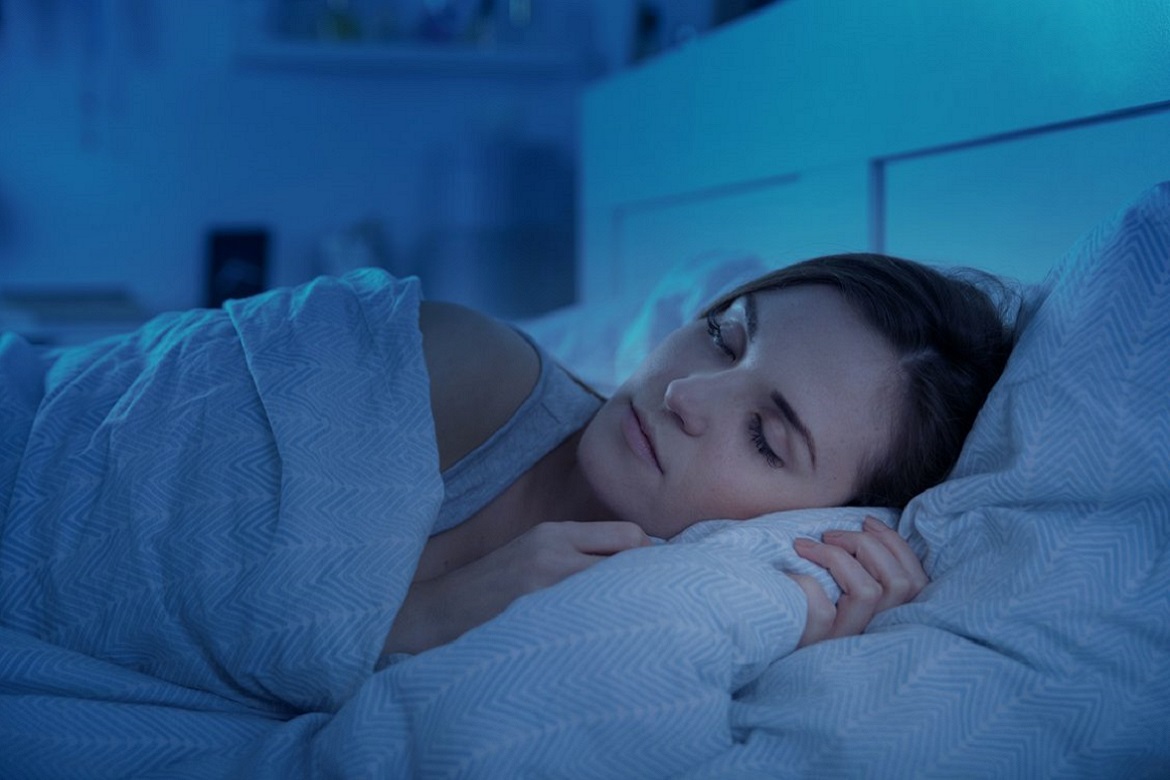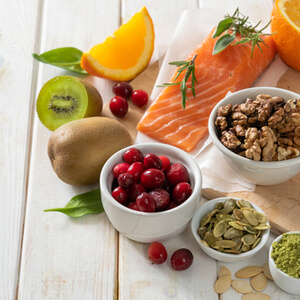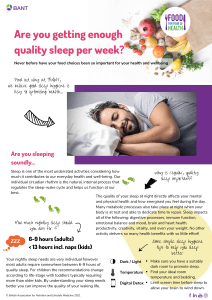
25 Apr 2022 A peaceful slumber: where nutrition meets sleep
 Sleep, beautiful sleep!
Sleep, beautiful sleep!
What is better than curling up under the covers, resting your head on a soft pillow and letting your body fall into a deep slumber? Sleep replenishes our cells, removes metabolic waste and toxins from our brains, and offers a chance to rest and conserve energy[1]. Research has shown that good quality sleep helps with learning and memory, boosts our immunity and can enhance our mental wellbeing[2].
Our sleep and nutritional status are inextricably linked. Disrupted sleep affects our food choices and the frequency with which we eat as we try to maintain our energy levels and wakefulness. Reaching for high caffeine-containing drinks, carbohydrate-rich foods high in sugar, and frequent snacking to stay alert can play a huge role in compromising the quality of our sleep[3].

Studies indicate that prolonged poor sleep could result in chronic low-grade inflammation, increasing our risk of heart disease, type 2 diabetes, hypertension, metabolic syndrome and obesity[4][5].
The link between sleep and weight gain relates to metabolic and hormonal dysregulation. A loss of sleep can reduce glucose tolerance and insulin sensitivity and can increase levels of ghrelin – the hunger-stimulating hormone – while decreasing leptin levels – the hormone which governs satiety[6].
Our timing, i.e. when we sleep, also impacts how we eat. Research indicates that those who go to bed later (where the mid-point of sleep is 5:30am or after), tend to sleep less overall, consume more calories and fewer vegetables than those who sleep earlier, and have a higher intake of carbohydrates, fat and protein after 8:00pm[7]. Late sleepers have also been shown to consume more caffeinated drinks and fast food[8].
What should you eat to sleep better?
Can eating the right foods improve our sleep? According to several studies, the answer is yes. There is enough evidence to suggest that nutrient-dense diets high in fibre, vegetables, fruit and protein, are associated with better sleep outcomes compared to diets composed of refined carbohydrates, processed food and saturated fat[9][10].
The Mediterranean diet, rich in vegetables, fruits, fish, wholegrains, and olive oil, is often hailed for its health-promoting properties, and this extends to sleep[11]. One explanation is that foods included in this diet are rich in nutrients and polyphenols, low in refined starches and sugars and require less processing, thus reducing the risk of sleep interference and disruption. In addition, some of these foods contain sleep-promoting compounds. Sour cherries also known as Montmorency cherries, for example, are full of antioxidants and also contain tryptophan, serotonin, and melatonin.
 Melatonin is a hormone released by the pineal gland which regulates circadian rhythms including the sleep-wake cycle. Melatonin is ordinarily produced in darkness so levels begin to circulate soon after sunset and reach their peak in the middle of the night between 2am and 4am. After this time, production begins to slow down and levels remain low during the day[12].
Melatonin is a hormone released by the pineal gland which regulates circadian rhythms including the sleep-wake cycle. Melatonin is ordinarily produced in darkness so levels begin to circulate soon after sunset and reach their peak in the middle of the night between 2am and 4am. After this time, production begins to slow down and levels remain low during the day[12].
Trials indicate that tart cherry juice can be helpful in reducing the severity of insomnia by increasing total sleep time and sleep efficiency, while reducing sleep latency (the time it takes to fall asleep) and the number of awakenings[13]. Although tart cherry juice appears to enhance melatonin, it does so moderately in comparison to melatonin supplements that may be prescribed for insomnia. Tart cherries also contain tryptophan, a chemical that is the raw material for the production of serotonin (which regulates our sleep and mood) and melatonin. This suggests that tart cherries may provide multiple benefits beyond melatonin to help us sleep better[14].
Kiwis also contain a high concentration of melatonin and have shown potential to improve sleep quality in a similar way to tart cherries. Kiwis are full of antioxidants and contain high levels of vitamins C and E along with serotonin. Eating two kiwis an hour before bedtime for four weeks showed promising results among a small group of individuals with sleep problems. The group reported reduced sleep disturbances and better sleep quality and sleep duration[15].
Consumption of fatty fish may also provide benefits for sleep, on account of high vitamin D and omega 3 fatty acid content which help regulate serotonin, the chemical needed for melatonin production[16].
Missing micronutrients and sleep rituals
Another path to improving sleep quality involves supplementing with B vitamins, magnesium, vitamin D and other micronutrients which may be deficient. Known as nature’s tranquiliser, magnesium in particular, has been studied in great depth with regards to sleep. Rich sources of magnesium include dark green leafy vegetables, wholegrains, nuts and seeds, beans and fish. Studies indicate that magnesium intake tends to drop among elderly populations thereby contributing to sleep deprivation which is common later in life. Low levels of magnesium can lead to reduced melatonin and sleep disorders, so in such cases, magnesium supplementation may be useful in alleviating sleep troubles[17].
Of course diet and supplementation are only part of the puzzle when it comes to ensuring a good night of rest. Sleep hygiene is vital. As we already know, darkness stimulates melatonin production, so ensuring a dark bedroom is essential to good sleep. This includes reducing the use of screens before bedtime which can adversely impact sleep by delaying bedtime, shortening total sleep time, reducing sleep quality and increasing daytime tiredness[18].
Monitoring alcohol and caffeine intake is also crucial among those with poor and fragmented sleep. The negative effects of both these substances on sleep quality have been well documented with researchers advising a reduction or avoidance, particularly in the case of caffeine in terms of caffeine-sensitive individuals[19][20].

Mindfulness and meditation techniques could also assist sleep-deprived populations by relaxing overactive minds. Sleep rituals can reduce stress, stimulating the parasympathetic nervous response, gently guiding our bodies from chaos to calmness[21].
How we rest at the end of each day depends on our unique circumstances. For those who work on shifts, establishing a routine and pattern of good sleep may be more challenging. Some of us may require changes to our diet, stress reduction techniques or perhaps a digital detox to sleep soundly.
Consult a Registered Nutrition Therapy Practitioner to identify the root cause of any sleep disturbances you have. Whatever your starting point, know that we are here to help you optimise your nutrition and help you drift off into a peaceful slumber.
Download our Food for your Health Guide to ‘Quality Sleep’ here.
Written by Vandana Chatlani, NT Dip, mBANT, CNHC for the BANT Food for your Health Campaign
Bibliography
[1] The neuroprotective aspects of sleep https://www.ncbi.nlm.nih.gov/pmc/articles/PMC4651462/
[2] The extraordinary importance of sleep https://www.ncbi.nlm.nih.gov/pmc/articles/PMC6281147/
[3] Dietary nutrients associated with short and long sleep duration. Data from a nationally representative sample https://www.ncbi.nlm.nih.gov/pmc/articles/PMC3703747/
[4] Diet and Sleep Physiology: Public Health and Clinical Implications https://www.ncbi.nlm.nih.gov/pmc/articles/PMC5554513/
[5] The Sleep-Immune Crosstalk in Health and Disease https://www.ncbi.nlm.nih.gov/pmc/articles/PMC6689741/
[6] Sleep and obesity https://www.ncbi.nlm.nih.gov/pmc/articles/PMC3632337/
[7] Role of Sleep Timing in Caloric Intake and BMI https://onlinelibrary.wiley.com/doi/full/10.1038/oby.2011.100
[8] Association between chronotype and diet in adolescents based on food logs https://pubmed.ncbi.nlm.nih.gov/19447353/
[9] High glycemic index and glycemic load diets as risk factors for insomnia: analyses from the Women’s Health Initiative https://www.ncbi.nlm.nih.gov/pmc/articles/PMC6997082/
[10] Effects of diet on sleep quality https://www.ncbi.nlm.nih.gov/pmc/articles/PMC5015038/
[11] Adherence to the Mediterranean Diet is Associated with Better Sleep Quality in Italian Adults https://www.ncbi.nlm.nih.gov/pmc/articles/PMC6566275/
[12] Melatonin: Pharmacology, Functions and Therapeutic Benefits https://www.ncbi.nlm.nih.gov/pmc/articles/PMC5405617/
[13] Influence of Dietary Sources of Melatonin on Sleep Quality: A Review https://ift.onlinelibrary.wiley.com/doi/10.1111/1750-3841.14952
[14] Pilot Study of Tart Cherry Juice for the Treatment of Insomnia and Investigation of Mechanisms https://www.ncbi.nlm.nih.gov/pmc/articles/PMC5617749/
[15] Effect of kiwifruit consumption on sleep quality in adults with sleep problems https://apjcn.nhri.org.tw/server/APJCN/20/2/169.pdf
[16] Effects of diet on sleep quality https://www.ncbi.nlm.nih.gov/pmc/articles/PMC5015038/
[17] The effect of magnesium supplementation on primary insomnia in elderly: A double-blind placebo-controlled clinical trial https://www.ncbi.nlm.nih.gov/pmc/articles/PMC3703169/
[18] Youth screen media habits and sleep: sleep-friendly screen-behavior recommendations for clinicians, educators, and parents https://www.ncbi.nlm.nih.gov/pmc/articles/PMC5839336/
[19] Sleep Quality and Sleep Patterns in Relation to Consumption of Energy Drinks, Caffeinated Beverages and Other Stimulants among Thai College Students https://www.ncbi.nlm.nih.gov/pmc/articles/PMC3621002/
[20] Evening intake of alcohol, caffeine, and nicotine: night-to-night associations with sleep duration and continuity among African Americans in the Jackson Heart Sleep Study https://www.ncbi.nlm.nih.gov/pmc/articles/PMC6802565/
[21] The effect of mindfulness meditation on sleep quality: a systematic review and meta-analysis of randomized controlled trials https://www.ncbi.nlm.nih.gov/pmc/articles/PMC6557693/


